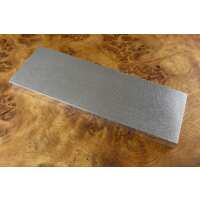
Big diamonds are more expensive (ask the missus), which is why the generously coated 140 Atoma costs a few pounds more than the other grades. JIS140 is equivalent to 120 microns, so it is extremely aggressive. Even after the plate has bedded in and lost it's initial 'bite', which is completely normal, the Atoma 140 still removes material with astonishing speed, it is mainly used for re-establishing or altering primary bevels and repairing damaged edges. If you have an eBay chisel with a massive bump in the back that needs correcting please talk to us before buying this tool. With the right technique it is possible, but if you're not sure what you're doing it's surprisingly easy to turn a chisel with a bump that cost you £10 into a chisel with a bump that cost you £100. The critical quality indicator to look for in a diamond stone is monocrystalline diamonds (each piece of grit is a single solid diamond) they are more expensive to produce but much more durable than polycrystalline diamonds. The Atoma plates we have inspected have all been remarkably flat. Plate size: 210mm x 75mm (8¼" x 2⅞") Do's: Use plenty of fluid and light pressure. Fading the pressure out gradually as you finish will leave a finer scratch pattern and reduce the amount of strokes you need to take on the next plate. Use light pressure, the diamonds are cutting tools and if you let them do their job they will serve you well for many years. Expect all diamond surfaces to have a vicious bite initially and then gradually bed in over the first few uses, this is completely normal. As long as you keep them clean and cool and avoid using too much pressure they will cut like the wind for years. Use liberal quantities of some kind of fluid on them, water with a few drops of dish soap, window cleaner, water treated with Honerite Gold all work well. Light contamination can be cleaned from the surface with an ordinary pencil rubber (eraser), if they get really grubby, moistening the surface with a bit of white spirit will help to lift the crud. Don'ts: Avoid using them with soft metals like brass, wrought iron or aluminium as these will gum up the surface and are impossible to remove. Avoid using them for the bevels of laminated blades as the backing material is often soft and will gum up the surface. Avoid using too much pressure, especially on the edges, the diamonds themselves are virtually indestructible, the electroplating that holds them to the surface will last much longer if you don't lean on it and scrub. Avoid using oily lubricants on them, the greasy residues attract dust which will gum up the surface.
Visit Product Page
